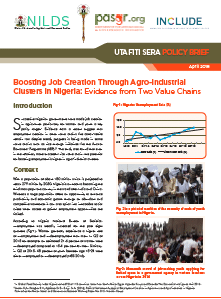The African Policy Dialogues on employment creation in agriculture and agro-processing in Nigeria has published a Policy Brief on “Boosting Job Creation through agro-industrial clusters in Nigeria: evidence from two value chains Nigeria”. The policy Brief describes employment and unemployment in Nigeria over time, noting that unemployment remains high and the reality of unemployment and underemployment is hardly fully captured. It also highlights the policies that have been initiated to create employment in agriculture and agro-processing. The impact of these policies has been limited by several challenges including;

- Fragmentation of value chains
- Institutional incongruence
- Bias for big capital
- Conflicts over land by herders and farmers
Policy recommendations
Employment in rice and cotton value chains can be enhanced through the development of agro-industrial clusters to tap both farm and processing opportunities by;
- Scaling and expanding of Anchor Borrowers’ Programme in rice value chain as well as other value chains;
- Revising the Anchor Borrowers’ Programme (ABP) guidelines and similar interventions to make provision for quota allocations whereby not less than 40 percent of beneficiaries will be women and youth; and
- Introducing special intervention programmes that target value chain clusters to encourage economies of scale, upgrade skills and stimulate peripheral economic activities.









